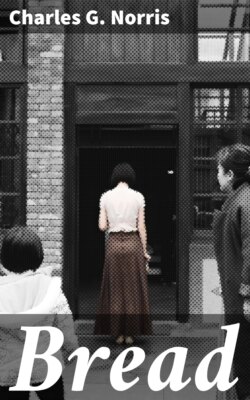Читать книгу Bread - Charles G. Norris - Страница 21
На сайте Литреса книга снята с продажи.
§ 4
ОглавлениеSaturday was their first intimate little meal by a window in a café. It had been their last morning at the office, and by noon the activities of the Soulé Publishing Company in selling the Universal History of the World had ceased. Pay envelopes had been distributed shortly after eleven, and an hour later all the little Jewesses with their absurd pompadours and high heels, the Misses Rosens and Flannigans, the office clerks and office boys had packed the great elevators for the last time, laughing and squeezing together, and swarmed out of the building not to return. And Roy and Jeannette were among them.
“You will go to lunch with me?” he had written on a sheet of paper and pushed toward her as she sat at his elbow. “I’ve got a lot of things to talk to you about, and it’s our last day here together.”
She had tried to consider the matter dispassionately, but a glimpse of his bright, eager eyes fixed on her had sent the blood flooding her neck and cheeks, and before she quite knew what she had done she had nodded.
He joined her at the street entrance and together they made a happy progress toward Broadway.
A great felicity descended upon them. Their senses thrilled to the beauty of the warm day and their being thus together. Roy piloted her through the hurrying noontime throng, his hand about her arm. She tingled again at the touch of his fingers, and loved it. Then they entered the café of a hotel, and found a cozy table for two by the window where, dazzled and enthralled by their great happiness, they smiled into one another’s eyes across the white cloth, glittering with cutlery and glasses.
Love was wonderful! He loved her; she loved him. They both knew it; they were drunk with the thought. This was their adventure,—theirs and theirs alone!
“I may have to go home this summer,” Roy said with a troubled air after he had given their order to the waiter. He stared at the winding crowd that surged back and forth beneath their window. “But I’m coming back right away. In August.”
“You mean to San Francisco?”
“My father wants me to come West for a month or two. He sent me my ticket.... I guess he expects me to settle down out there. Of course he wants me to. The ticket is only a one-way one. But he’s in for a disappointment. I can’t be happy in San Francisco; I want to come back to New York.”
They both fell silent, thinking their own thoughts. Jeannette was conscious of the dreariness and drabness of life once more; it was disheartening and depressing to be unemployed. All these people hurrying past the window, she reflected, were intent upon some particular errand; each one had a job; the whole world had jobs but herself. There would be nothing for her to do but “apply for employment.”
“Please can you give me a position? ... Excuse me, sir, I’m looking for work.... Could you use a stenographer?”
Oh, it was detestable, it was intolerable! It dragged her pride in the dust! ... And there would be no one to sympathize, to advise her,—or help her! She would be alone all summer in New York with no one interested!
Roy, watching her, guessed her thoughts.
“I’m coming back....”
She flushed warmly.
“Would you like me to come back? Would it make any difference to you, if I did? If you’ll just say you’d like me to come back, I will; ... I’ll promise! ... Will you?”
The girl bent over her plate, hiding her face with the brim of her hat. The giddiness she had experienced that day in the street threatened her.
“Would you want me to come back?” Roy insisted.
She raised her eyes and met his gaze; he held them with the burning intentness of his own, and for a long, long moment they stared at one another.
“You know I love you,” he said tensely.
His lip quivered; his face was aglow.
“I love you with every fibre of my being! I’ll come back to you,—I’ll come back from the ends of the earth. Only just say you love me, too, Jeannette.... You do love me, don’t you? ... You’re the most wonderful girl I’ve ever known, Jeannette! ... God, Jeannette, you’re just wonderful!”
Why was it that in the supreme moment of his great avowal he seemed a little ridiculous to her? She felt suddenly like laughing. He was so absurdly young, so juvenile, so school-boyish, leaning toward her across the table in his youthful Norfolk jacket, with his unruly hair sticking up on top his head!
